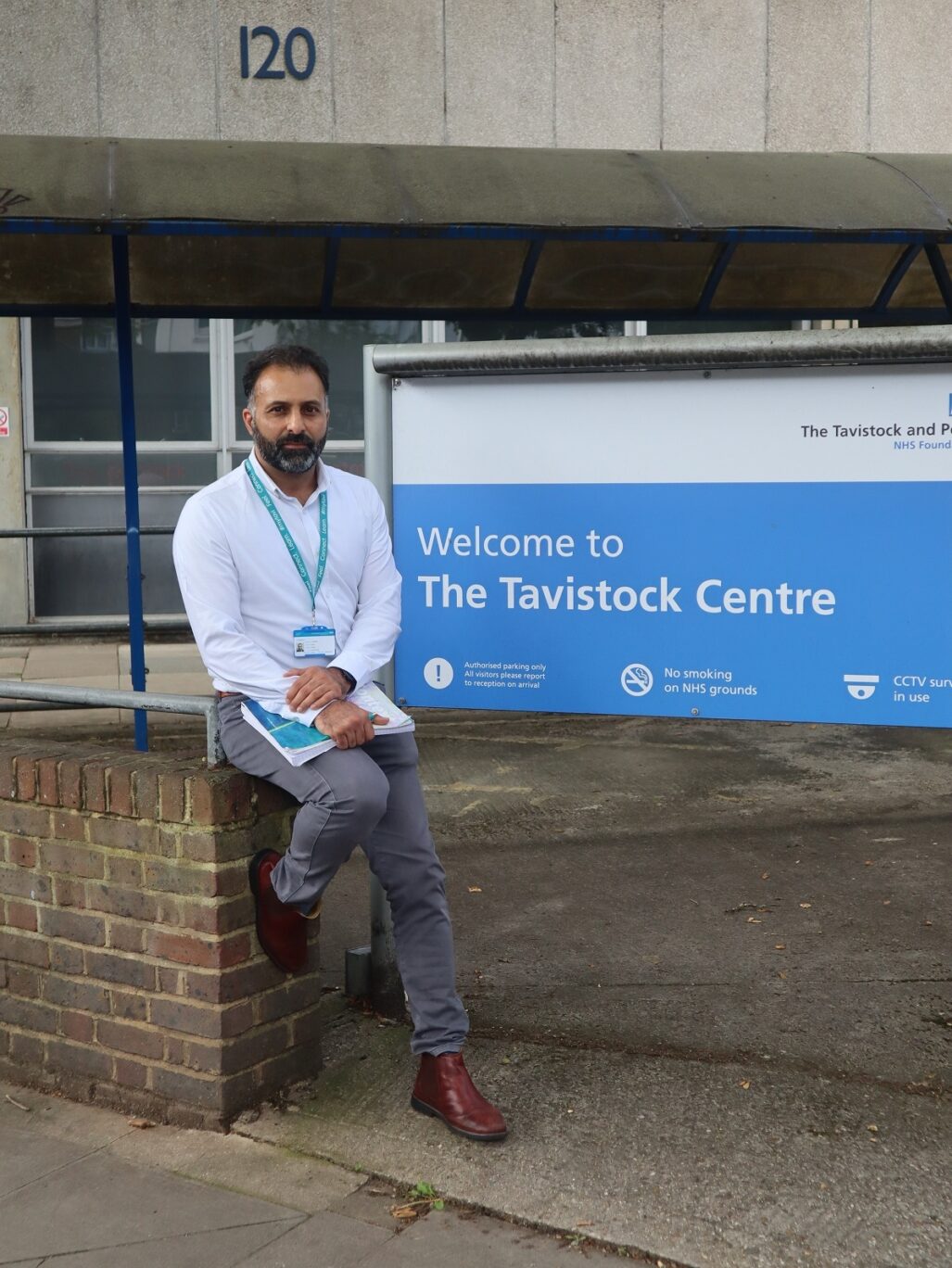
From patients to therapists, this systemic therapy course is changing lives
Rooms with one-way mirrors, and therapy under the live observation and supervision of a group of therapists might sound like unusual therapeutic practices, and yet are proven and core parts of systemic psychotherapy and training. Also known as family therapy, since the 1950s systemic therapy has been revered for its ability to explore mental health and relational problems within the context of what’s happening for a family or group as a system.
As society grapples with the complex global mental health crisis uncovered by the pandemic, this oft-sidelined form of therapy could offer a way through, using its whole systems approach. We look at one of the UK’s top courses in systemic psychotherapy to find out how.
*Names have been changed to protect the identity of patients

“As parents, we were despairing about how best to support our daughter when she started self-harming due to the bullying she was experiencing at school,” says Paul.* “We could see she was becoming more and more distant from us and spending more and more time in her room, which worried us even more about her mental health.”
These parents had tried their best. In the end, Paul says it was family therapy that provided a glimmer of hope.
“We began to see how for the past few months, us going upstairs to her room and trying to get her to talk was having the opposite effect and pushing her more inwards. Not talking to us was not because we were doing such a bad job as parents, but because she didn’t want to worry us. Hearing the different perspectives from the other members of the team gave us different ideas to think about. It helped our daughter to slowly open up with what was happening with her, and helped us listen rather than feeling pressured to fix things for her. I am not saying everything is perfect now, but the conversations in the therapy has given us some guidance about how we can do more of this kind of talking at home.”
Family therapy, also widely known as systemic psychotherapy, explores relationships between a group of people who are connected together (a system) and contextual factors influencing these relationships, rather than solely on an individual’s thoughts and feelings. This system can be a family, a couple, work colleagues or an organisation, for instance.
People often wrongly assume that systemic therapy is only for families when in fact, systemic psychotherapists work with individuals, couples, families across all ages, as well as organisations.
Research shows that it is helpful, sometimes more so than other approaches, for a broad range of difficulties, and has been recommended in the 659 NICE Guidelines for a range of presenting psychological and psychiatric difficulties, including family distresses, anxiety disorders, depression, addiction, chronic physical illness, grief, eating disorders, psychosis, and abuse in children, young people, and adults.
“It takes a relational context. We’re all part of relationships, even if we present for therapy as individuals. We’re all part of wider systems and networks of relationships,” says Shila Rashid, a systemic psychotherapist, and course lead of a popular postgraduate course on the same subject at the Tavistock and Portman’s Education and Training Centre.
“And there’s something about that which speaks to people for working with real-life issues that come up for everybody across all backgrounds, irrespective of class, race, religion, disability, or sexuality. We’re all in relationships, and we can at times benefit and at times suffer within them as well.”
Therapy for the times we’re in
Systemic therapy is often overlooked, particularly as one-to-one therapies now enjoy a revival in pop culture, with frequent TV show portrayals and trendy therapist influencers on social media.
However, that relational context Shila speaks of, gives systemic therapy an edge in dealing with problems that have emerged in the wake of the covid-19 pandemic.
“The pandemic revealed the huge mental health issues going on in our population for our time but brought to the fore much more. The needs of groups that are being differentially impacted, for instance, people from marginalised groups, and the LGBTQ+ communities for example,” says Shila.
Baber Siddiqi agrees. He is studying for the Systemic psychotherapy MA degree programme, known as M6 at the Trust’s education and training centre. When he’s not studying, he works full time as a clinical therapist for the London Borough of Croydon’s Looked After Children’s Services.
“The complexity and interconnectedness are really important,” says Baber. There’s something about how this form of therapy holds everyone in mind. There’s lots of things that intersect and affect who we are, race, social status, lived experience for example,” says Baber.
Following the pandemic he’s seen a prevalence of issues like school refusal, challenges transitioning into adolescence, and young people grappling with the world of social media.
“We look at anything that’s affecting the family system, what’s happening for them at school, at home, in neighbourhoods, for the adults at work. We cast our net really wide in terms of what’s affecting the family. We’re always looking for relationships and patterns in communications, which ones are healthy and unhealthy. There are a lot of things that help us to think. We’re not limited to particular disciplines. We might think about philosophical thinking, or language and meaning.
“The training we get is not just applying it to families but to organisations as well. So, we think about systemic approaches to organisational dilemmas and challenges, for example when teams are not working well, or there are morale issues and disagreements,” says Baber.
Baber had no dreams of becoming a systemic therapist. But his intrigue in how things interact in systems beckoned him to the Systemic psychotherapy (M6) course.
“My first degree was biotechnology, the world of microorganisms, viruses, bacteria, but it is systems thinking so you’re always looking at complex systems and the dynamics and interrelationships to figure what’s going on,” says Baber.
Baber left his day job at Oxford University to join the NHS, where he uses that same systems-thinking to help families and organisations.
The many sides of M6
The uniqueness of systemic therapy is reflected in the Systemic psychotherapy (M6) course, which has been running since 1975 and was the first university-validated course in systemic therapy in the UK.
The course thrives on the interconnected relationship between the Trust’s clinical, patient-facing services, and its training and education arm, where students learn. Trainees see actual patients and hone their practice with feedback from their supervision group, while increasing the Trust’s capacity to treat more families each year.
The Systemic psychotherapy (M6) course is rigorous and unique. In a way, it places trainees in a parallel ‘system’ where they must explore relationship dynamics between their peers, supervisor, clients and the world around them.
Trainees are required to learn through various methods – clinical work in their own workplaces, personal and professional development, research, teaching and consultancy, lectures and seminars. There is also mandatory weekly clinical supervision, where they must provide systemic therapy to service users, under the live supervision of their supervisor and three peers, who observe and offer therapeutic ideas to the clients from another room through a one-way mirror.
Families can sometimes find the one-way mirror and live supervision strange at first, Baber points out, but this feature, which is unique to systemic therapy, sets the course apart from other forms of therapy training.
“It’s a rich exchange of multiple perspectives on what’s going on for the family and young person,” explains Shila.
“The therapist is in the immediate room connecting with the family and responding in the moment to what’s happening, including what they’re feeling emotionally and what they’re picking up in the emotional ambiance. Having done some pre-thinking with the team, then there’s the position of team behind the screen, observing, listening, thinking from the position removed from the immediacy of the session with the family/clients. What about power dynamics? They are listening in depth with what the family are saying and connecting it with what the family is presenting in terms of difficulties and building hypotheses; possibilities about what may be happening and where the conversation needs to go to improve communication and relationships. Sometimes the supervisor may phone in and/or the team comes into the room where the family is being seen and share their reflections or ask the trainee to pick up on a particular theme or issues,” says Shila.
Baber and his M6 supervision group were seeing a family with a 13-year-old who was struggling with anxiety and school related difficulties. Systemic therapy helped them to see a wider picture of what was going on, and they were able to use a trauma-informed systemic approach to address a possible neurodevelopmental diagnosis, deliver CBT for anxiety, and prescribe home tuition as an alternative during treatment. Some way into the therapy, the young person resumed attendance at school.
“The family was able to sit behind the mirror and listen to the team reflect, focused on their strengths and resilience. By the end they felt confident and hopeful about the future,” says Baber.



The danger of a single story
By looking at how systems interact, Baber says the course encourages students to consider different perspectives and move away from pathologising or putting a label on the problem.
“We try to move away from, ‘She’s the problem’ or, ‘That’s the problem’, and think about the relationships. What is it about those that aren’t working well? So if a child has additional needs, what needs to happen for that child to feel connected and supported, and for that child to feel held? If someone has depression, how does that affect their daily life? We try to be curious rather than taking a reductionist viewpoint,” he said.
This aspect of the teaching was hard hitting for course alum, Enister Ngala, who now applies it to her daily practice when seeing service users, at her NHS job supporting children with neurodevelopmental needs in her local Child and Adolescent Mental Health Service.
“It’s this idea of multiple perspectives about people’s lived experiences. There are many parts to us. I can be a writer and a farmer, but I can also be a teacher. Some ideas have kept families in a place of suffering. I can help engineer change and it’s because of my course,” says Enister.
“Some children look for diagnosis, and some are against it. Some of them find it helpful, others not. What I’ve come to embody is not be married to one idea that they have a diagnosis of autism.
“Who are they when they’re not thinking of being autistic? What are their strengths? What do they enjoy in life, what do other people delight in them? The writer Chimamanda Adichie talks about the danger of a single story, that is defining people by a label,” she says.
This principle wasn’t exactly new to Enister, a third generation Cameroonian, who was the valedictorian at this year’s graduation.
“My grandma and mama would say ‘Nyweh yuh nyweh njooh nweh’ (in the Libum language spoken by the Wibum people of Northwest province of Cameroon), which means ‘somebody is somebody because of somebody!’ It is a concept called Ubuntu, that means ‘I am because we are.’ Us humans are intrinsically connected to each other. It is the recognition that we are all bound together in ways that can be invisible to the eye,” she says.
Application and global relevance
In a post pandemic world, following the MeToo Movement and rising focus on global activism following events like the murder of George Floyd, these multiple perspectives and considerations of wider contexts offered by systemic training are increasingly becoming more valuable to students who choose to take the course.
Amell El-Guenuni, an M6 alum and family therapist of Moroccan origin says: “The course challenged me in many ways to think differently about myself and the world around me, which developed my skills as a therapist. I feel proud as a woman of colour to be able to utilise the skills I have gained from my training to support families from different backgrounds and faiths.”
Amell works with a specialist NHS service supporting families and communities affected by the 2017 Grenfell Tower fire, the UK’s deadliest disaster in decades, in an area predominantly home to people from ethnic minority groups.
She attended the course remotely during the pandemic.
“I felt like an imposter on the first day of online training, more-so as I was the only woman wearing a hijab (head scarf) in my cohort. But despite all that, I feel as a systemic therapist I have developed a lens in my training that will remain deeply rooted in my practice for life,” says Amell.
The course teaches students to think critically about their own lived experiences in wider contexts.
Shila says: “Training takes account of wider and important issues that impact people’s lives, racism, sexism, class, when people experience being othered and marginalised and discriminated against: our students develop ways of working that are anti-oppressive, anti-discriminatory, taking power differentials in relationships into account, and focus on people’s resources and resilience.
In high demand
The way Systemic Psychotherapy (M6) is structured makes it highly relatable to trainees. For some, like Tibor Marta, the impact was profound.
“It became personal – it had personal application. It was answering questions that I had about my own life. I really got into it, and naturally wanted to take it to the next level,” says the final year M6 trainee, who works as an occupational therapist for an NHS community mental health service.
That came as a surprise to Tibor, who initially decided to take up the course because his options for career progression were limited. Now, Tibor gladly commutes from his coastal village in Norfolk to pursue the course in North London.
“I like the mental stimulation, and the new ideas and ways to do things on a professional level, but it has been really meaningful to me personally. I had a lot of things I didn’t understand about myself that I understand a whole lot more about: some of my thoughts, feelings, motivations, and where my patterns of behaviour come from.”
With this kind of impact, word gets around quick. As the UK’s longest running course of its kind, its reputation is hard to outshine. Students can study in other places, but many of them dream of qualifying here.
This year alone the Tavistock and Portman received almost 100 applications. The calibre of students is exceptionally high, and since there are only 36 places, many students reapply year after year.
“There’s a huge waiting list of people wanting to come in, and have people who keep applying the following year. We’d love to expand and develop the course online to increase accessibility for people,” says Shila.
“People who come here mostly come from other professions, and they come from all kinds of different backgrounds, from psychiatry to psychology, nursing, social work, art therapy, civil servants who have had a change in career, and even some journalists who want to retrain.”
This course has a way of staying with people. Caroline McKenna knows. She is the Deputy Medical Director at the Trust. “I did the training 20 years ago, and it was great. It stays with me every day in my work, the skills I have learnt.”
For trainees like Tibor, Baber and recent alumni like Enister, the power of systemic therapy remains thrilling.
Enister says: “There were moments of tears. It was transformational and really hard and exciting. Some bits really stretched us and our brains. It expanded me. I learnt so much. It taught me about the things that make me who I am, and things I was not aware of and why I’d respond in certain ways. It gave me an intergenerational understanding of my own lived experience in connection to my own family.”
This article was originally published on tavistockandportman.nhs.uk.
Intrigued? Learn more.
The longest running course of its kind in the UK, our Master’s degree in Systemic psychotherapy (M6) provides you with a professional qualification accredited by the Association of Family Therapy (AFT) and enables you to register with the United Kingdom Council for Psychotherapy (UKCP).